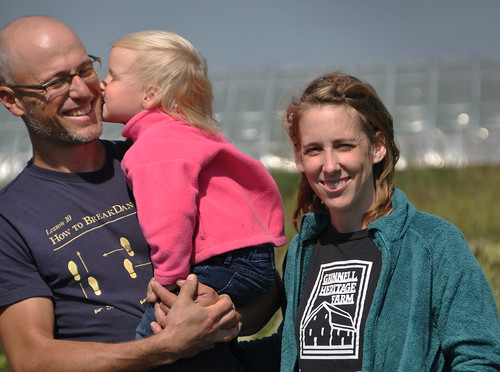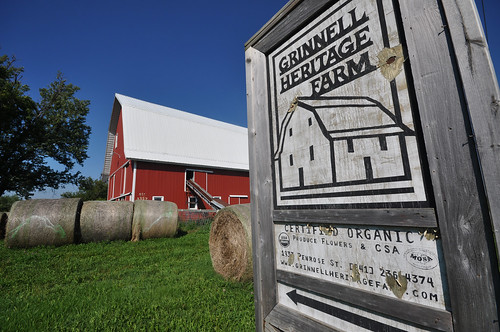
Some people are born to farm. Others grow to love it. In Melissa Dunham’s case, she fell in love with a farmer — and now she loves both the farmer and the farm.
“I was happily employed in the Twin Cities, but then I fell in love with this wonderful man who told me he was an organic vegetable farmer,” Melissa said. “I thought, ‘Sure, why not?’ We got married within seven months.”
It was an unexpected career and life change. “Everybody thought I was nuts moving down here to central Iowa to be a farmer,” she said. But now she’s growing food she believes in — and in a way that will leave the land in better condition for the generations to follow.
She and her husband, Andy Dunham, own and operate Grinnell Heritage Farm in Grinnell, Iowa. The certified organic farm has grown from three acres in 2007 to 22 acres today and produces more than 60 varieties of plants and vegetables.

“We grow everything from asparagus to zucchini,” Melissa said.
The Dunhams understand that the health of their soil translates into healthier crops and a more resilient farm. A fifth-generation farmer on the Grinnell farmland, Andy has made improving the health of the farm’s soil a major priority.
“Our philosophy is feed the soil, it will feed your plants, and then it will feed us,” he said.
Judging from the farm’s improvement in yields over time, this approach is working. “We read the ‘Knott’s Handbook for Vegetable Growers,’ which is kind of the vegetable grower’s official handbook, and our yields are almost always well above what their best yields are projected,” said Andy.
Working with USDA’s Natural Resources Conservation Service (NRCS), the Dunhams have been able to accelerate the adoption of a number of resource-protecting practices through the agency’s Environmental Quality Incentives Program (EQIP).
“There were several practices, like adding hedge rows for wildlife habitat, that we probably wouldn’t have been able to do without the EQIP contract,” Andy said.
The Dunhams were also able to take advantage of EQIP’s Organic Initiative back when they were converting from a conventional farming operation. “We did an awful lot of stuff with cover cropping and we did a lot of things for managing water quality,” he said. “The program was very helpful.”
Cropping diversity plays a central role in improving soil health because plant diversity above ground promotes biological diversity below ground, but it also plays a part in keeping the farming operation resilient.
“We have had some really, really severe weather swings over the last seven years and on numerous occasions. It’s either been too wet or too dry or both,” said Melissa. “Last year we had both flooding and a drought, but by being diverse we have been able to stay in the black. It’s helped us stay afloat when the weather extremes aren’t in our favor.”
While all farmers have to deal with weather-related issues, organic farming has additional challenges — like not being able to use synthetic nutrients or pesticides to control weeds and harmful insects. However, Andy believes it’s worth the extra effort.
“People who are wary of an organic system think it takes a lot of management — and it does,” he said. “But if you stay committed, if you follow the principles — even if you make a few mistakes — and stick with it, things will get better. The yields will go up and you can rejuvenate tired soils. It can be done.”
Inherent farming challenges notwithstanding, a lot of good things are being raised on the Grinnell Heritage Farm including healthy food, healthy soil, a healthy family and a chance to teach other people about farming. “And I love being able to spend this much time with my family,” Melissa said.

